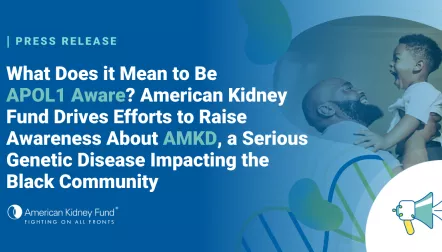
Blog post
Three posters highlighting AKF programs presented at 2023 Spring Clinical Meetings
AKF presented three posters at the National Kidney Foundation's Spring Clinical Meetings held on April 11-15, 2023 in Austin, Texas. The featured posters represented abstracts accepted by the National Kidney Foundation that highlight key AKF initiatives, titled: Variables impacting home dialysis utilization among AKF financial assistance recipients, Qualitative analysis of people with APOL1-mediated kidney disease highlights need for patient-centered educational resources, and American Kidney Fund Health Equity Coalition: interprofessional collaboration addressing four domains of racial disparities in kidney disease. We've included summaries of each poster below.

Qualitative Analysis of People with APOL1-Mediated Kidney Disease Highlights Need for Patient-Centered Educational Resources
Variants in the apolipoprotein L1 (APOL1) gene, common in people of West African descent, contribute to the higher incidence of end-stage renal disease in Black people compared to white people. While 13% of Black Americans carry two copies of the APOL1 (Apolipoprotein L1) gene, limited knowledge of APOL1-mediated kidney disease (AMKD) among those at risk and their providers poses a barrier to timely interventions. AKF sought to gain insights from AMKD patients to learn about their unique needs and challenges to inform the development of patient-centered, educational resources.
Through convenience sampling, five participants were recruited for virtual, 60-minute interviews: four living with AMKD and one caregiver. Findings revealed four overarching themes: limited AMKD awareness, healthcare biases, discomfort with discussing health with family, and a lack of patient-friendly education material. All five participants had either never heard of or knew very little about AMKD prior to diagnosis.
Qualitative analysis revealed the need for AMKD educational resources reflective of best practices in health literacy. Additionally, patients at high risk for AMKD need support with being self-advocates within the healthcare system and with navigating family conversations about health. As part of this research effort, AKF launched an AMKD education campaign centered around tackling these barriers.
AKF's APOL-1 mediated kidney disease education campaign is sponsored by Vertex Pharmaceuticals Inc.

Variables impacting home dialysis utilization among AKF financial assistance recipients
Black and Latino Americans are more likely than white Americans to develop kidney failure and face barriers to equally accessing home treatment options, including peritoneal and home hemodialysis. Although home dialysis often yields more benefits than in-center dialysis, such as better sleep and fewer medications, home dialysis utilization among Black Americans and Latinos is low compared to whites. For more insight into this disparity, AKF conducted a survey among its financial assistance recipients, who have kidney failure or live with a transplant, and are primarily Black and Latino and low-income.
The survey featured 30 questions on treatment modality, provider conversations on treatment options, and barriers and drivers to treatments. The survey was completed by 856 respondents, with 72 percent using in-center dialysis, 19 percent using home dialysis, and 7 percent transplant recipients. While home dialysis respondents reported many benefits, only 20 percent of in-center dialysis respondents indicated interest in home treatment options. Among in-center dialysis users, 87 percent reported providers spoke to them about home dialysis, suggesting low interest is unrelated to awareness. The most cited variables deterring home dialysis were comfort level, psychosocial needs, no space for supplies, and infection fears.
The survey underscores the need for social support for home dialysis patients and customized education materials responding to patients' social, financial, and health considerations. Through these approaches, dialysis patients may feel more empowered to make treatment decisions considering all relevant factors and be afforded the experience of social support if they choose to dialyze at home.

Interprofessional Collaboration Addressing Four Domains of Racial Disparities in Kidney Disease
AKF formed its Health Equity Coalition (HEC) as a primarily organization-based alliance with the strategic purpose of aligning expertise to guide evidence-based actions to address race-based disparities in kidney disease within four domains: 1) Prevention, 2) Clinical trials, 3) Transplant, and 4) Home dialysis. Members were invited to join the HEC based on their expertise and influence related to at least one of the four domains. With input from the coalition, AKF crafted a framework for programs and cooperative action to achieve associated objectives aimed at educating providers and strengthening patient knowledge and skills.
To obtain a joint response, coalition members were placed in one of four moderated domain-based focus groups to define viable solutions to respective domains' disparities. AKF analyzed and categorized their responses by established criteria for either short, intermediate or long-term solutions. The focus group and coalition solutions prioritization analyses resulted in one clinical trials-related project implemented in 2022, two in 2023, three for home dialysis in 2023, one for transplants in 2024, and three for prevention between 2023-2024.
AKF's Health Equity Initiative is supported by Presenting Sponsors AstraZeneca, Boehringer Ingelheim and Eli Lilly and Company, Travere Therapeutics, Inc., and Vertex Pharmaceuticals; Equity Sponsor Otsuka America Pharmaceutical, Inc.; and Merck.





